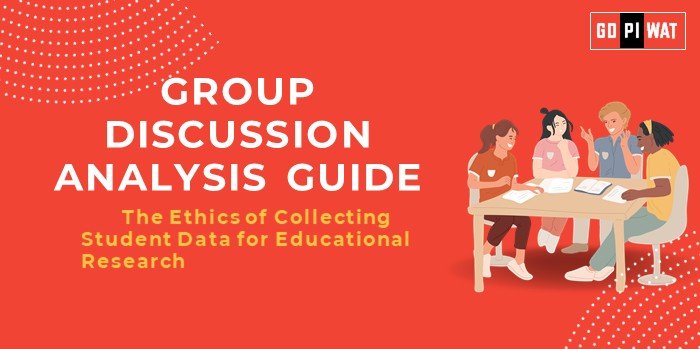📋 Group Discussion Analysis Guide: The Ethics of Collecting Student Data for Educational Research
🌐 Introduction to the Ethics of Collecting Student Data
- 📍 Opening Context: The rise of big data and AI in education has transformed the learning landscape but has also raised significant ethical concerns. Collecting student data for research offers insights into learning behaviors but poses risks to privacy and autonomy.
- 📜 Topic Background: As institutions increasingly employ advanced analytics for improving education outcomes, the ethical debate centers on balancing innovation with individual rights. Recent controversies over data breaches and surveillance highlight the need for a transparent framework.
📊 Quick Facts and Key Statistics
- 🌍 Global EdTech Market Value (2024): $377 billion, underscoring data’s central role in education innovation.
- 🔐 Data Breaches in Education: 6% of all reported breaches in 2023 occurred in educational institutions, emphasizing vulnerabilities.
- 🧑🎓 Student Consent Rates: Studies show that 40% of students feel uninformed about how their data is used.
- 🌐 EdTech Regulation: Over 80 countries have enacted data protection laws, reflecting global concern over student privacy.
🤝 Stakeholders and Their Roles
- 🏫 Educational Institutions: Implement data policies and safeguard student information.
- 🔬 Researchers: Leverage data to improve pedagogy while adhering to ethical guidelines.
- 👨👩👧👦 Students and Parents: Consent providers, often the most affected by data misuse.
- 🏛️ Governments: Enforce regulations like GDPR and FERPA to ensure responsible data use.
- 💼 Private Companies (EdTech): Innovate using data, often facing scrutiny over privacy practices.
🏆 Achievements and Challenges
🌟 Achievements
- 🎯 Personalized Learning: Data-driven platforms enhance learning outcomes through tailored content and insights.
- 📊 Policy Insights: Educational data analytics guide national policy for curriculum improvements and resource allocation.
- 🛡️ Inclusion: Predictive analytics help identify at-risk students, enabling early interventions and targeted support.
⚠️ Challenges
- 🔐 Data Privacy Concerns: Breaches expose sensitive student records, raising safety and ethical concerns.
- 📄 Lack of Consent Transparency: Students and parents are often unaware of how and why their data is collected.
- ⚖️ Bias in Data Analytics: Algorithms risk perpetuating inequities if data lacks diversity or is poorly managed.
🌍 Global Comparisons
- 🇺🇸 US: FERPA protects student records but struggles to adapt to emerging EdTech challenges.
- 🇪🇺 EU: GDPR’s stringent data protection requirements have set global standards for privacy and ethical data usage.
📖 Case Studies
✅ Success: Finland’s AI-driven education system showcases ethical and secure student data usage.
❌ Challenge: Cambridge Analytica’s misuse of Facebook data included student profiles, raising global alarms about data exploitation.
💬 Structured Arguments for Discussion
✅ Supporting Stance
“Data analytics enable transformative education reforms, enhancing accessibility and outcomes.”
❌ Opposing Stance
“Without robust safeguards, data collection infringes on student privacy and autonomy.”
⚖️ Balanced Perspective
“While student data drives innovation, ethical concerns must guide its collection and usage.”
🚀 Effective Discussion Approaches
🔑 Opening Approaches
- 📊 Start with a Case Study: “Cambridge Analytica’s data misuse highlights the risks of unethical data handling in education.”
- 🔀 Use Contrasting Statistics: “While 40% of students feel uninformed about their data usage, robust frameworks like GDPR provide effective solutions.”
- 💡 Pose a Provocative Question: “Does the promise of better education justify potential invasions of privacy?”
🤝 Counter-Argument Handling
- 🛡️ Highlight solutions like anonymization, consent-based policies, and secure technologies like blockchain.
- 🌐 Present global regulations (GDPR, FERPA) as examples of balancing data usage and privacy protection.
🔍 Strategic Analysis of Strengths and Weaknesses
- 💪 Strengths: Promotes tailored learning, early interventions, and policy advancements.
- ⚠️ Weaknesses: Risk of data breaches, algorithmic biases, and lack of transparency.
- ✨ Opportunities: Implement blockchain for secure data sharing and expand regulatory frameworks globally.
- 🚧 Threats: Rising cyberattacks and public distrust in data collection practices.
🎓 Connecting with B-School Applications
- 🌍 Real-World Applications: Explore intersections with business ethics, regulatory strategy, and technology management.
- 💬 Sample Interview Questions:
- 💡 “How can institutions balance educational innovation with student privacy?”
- 💡 “Discuss a case where data collection in education led to controversy and its resolution.”
- 🚀 Insights for Students:
- ✨ Highlight ethical considerations in AI-led education projects and internships.
- 📊 Analyze EdTech business models and study data governance frameworks for education technology.


